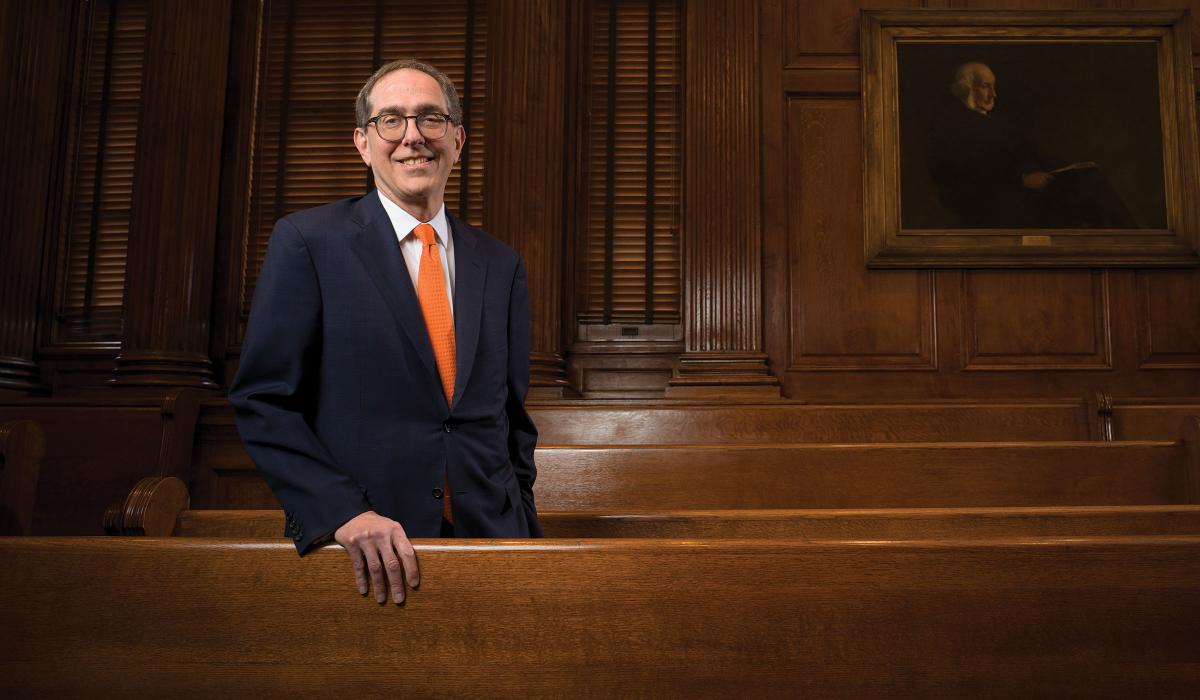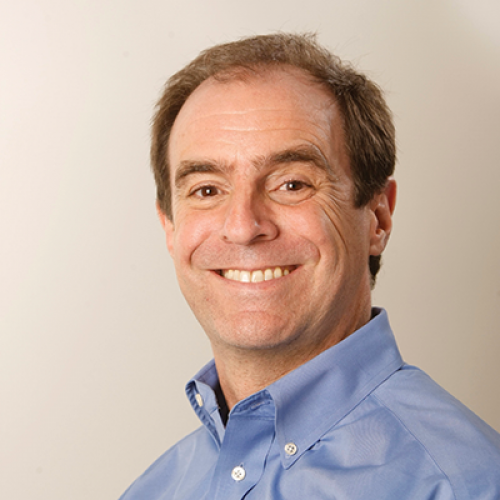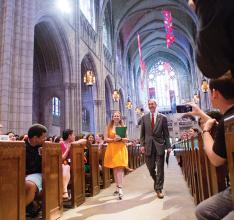Last month marked a decade since the Board of Trustees selected Christopher Eisgruber ’83 to be the 20th president of Princeton University.
They have been busy years for Eisgruber, who has overseen a capital campaign, a construction boom, expansion of the undergraduate student body, the acceptance of transfer students, the creation of new academic programs, an increase in the size of the administration, and robust growth in the endowment, among much else. He has also seen the University through the COVID-19 pandemic and perhaps the greatest period of social and political unrest since the Vietnam era.
All that is far more than could be covered in an hour, but in March, Eisgruber sat down with PAW senior writer Mark F. Bernstein, a fellow member of the Class of ’83, to discuss his tenure and some of the many issues facing the University today. Included in the interview were several questions submitted by PAW readers.
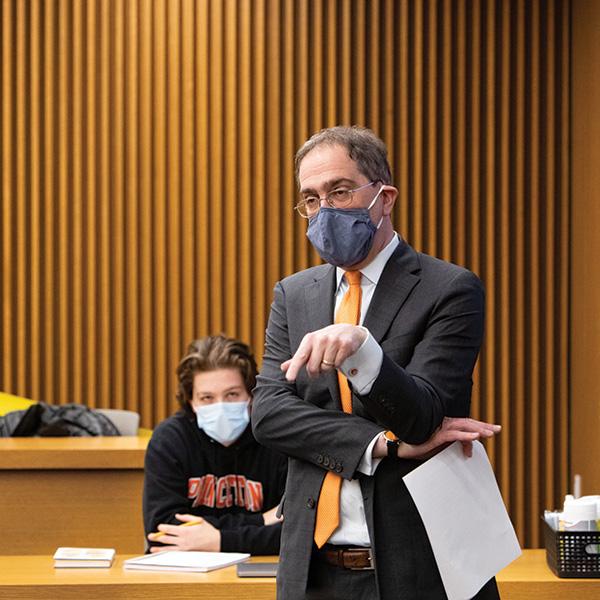
Last year, the trustees voted to extend your tenure as president for at least another five years. Did you consider stepping down, and what made you decide to stay?
I was enthusiastic about the possibilities for Princeton. I was continuing to enjoy the job and, given my enthusiasm and the confidence of the board, I wanted to be able to put that message out to the community. On the one hand, it was great to be out of the pandemic, but on the other hand, there are many exciting things I wanted to do going forward. I wanted to be able to take advantage of those opportunities and be able to communicate publicly about it.
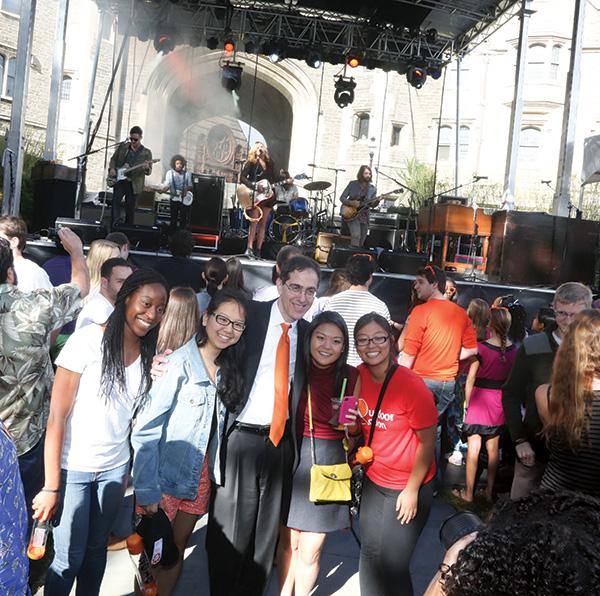
This is a question from Kenneth Norwood ’55: If you had the opportunity to do it over again, would you accept the job?
Yes, I absolutely would! (Laughs) I appreciate the question, because there has always been an alternative that has been extremely attractive to me, which is to be a member of the Princeton University faculty, which I consider one of the most extraordinary jobs in the world. When I was asked to become provost [in 2004], my first reaction was, I can’t do this because I love teaching and scholarship and I’d have to give a lot of that up, which has been true. But at the time, what I also thought was, this is an exceptional opportunity to give back to an institution that I love, and to learn things that I would never otherwise have learned.
Part of what fires me up about being president, and what made me want to stay on, is just the opportunity to meet with the extraordinary members of this community. One of the hardest things about the pandemic was the isolation. I love the opportunity to be a part of all the things that are going on on the Princeton campus and to continue to get to know Princetonians and learn their stories.
28: Transfer students enrolled for the current academic year as compared to 2013, when there were none.
Columbia recently announced that it will no longer require SAT or ACT scores in undergraduate admissions. Princeton has committed to extending its own test-optional policy until 2025. Is the University considering making this policy permanent?
We will look at how things go over the next few years, and then make a judgment. As [Dean of Admission] Karen Richardson [’93] and I look at it, there are advantages and disadvantages to getting the information contained in test scores. The advantage is that you learn a bit more about the 18,000 or so students who are qualified to come to Princeton, which helps in making these incredibly difficult decisions. So, all other things being equal, it would be great to be able to have the information. But all other things are not equal. We know that if we require these tests, there are people who are potentially extraordinary Princeton students who may take themselves out of the running by thinking, well, I’m not going to get in there, or my test scores don’t show me to my best advantage. By going test optional these last few years, we have seen increased diversity in our applicant pool in ways that are highly desirable.
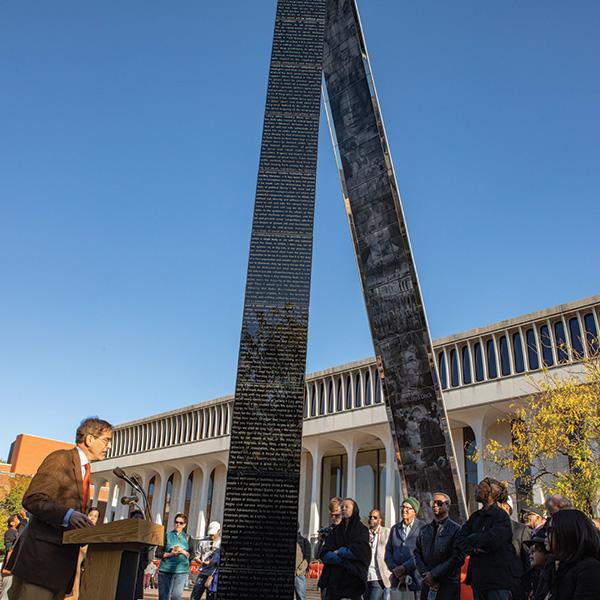
Mitch Daniels ’71, who recently stepped down as president of Purdue University, managed to keep that university’s tuition unchanged for 12 years. Princeton’s tuition seems to rise nearly every year. Why can’t Princeton do what Purdue has done?
I have great respect for Mitch Daniels and what he did at Purdue, but we’re obviously different institutions and approach these things differently. At Princeton, our philosophy is that we’re going to subsidize the education of every student. Even if you’re a full-paying student, the University, through a combination of the endowment, annual giving, and other sources, is picking up roughly half the cost of your education every year. In other words, you’re getting a discount, even if you’re paying full freight.
We’re also always going to try to make that education better every year, and along with that is our commitment to affordability and access, which is why our financial aid program is the best in the country. Students from families making $100,000 a year or less are going to be able to go to Princeton for free — and I mean free tuition, room, and board. So, then we say that, with all of that in place, we think it’s fair to pass along some of the costs — not all of the costs — of the inflation that we face in higher education and the improvements that we make to the education that we offer, to those who are coming from families where they’re fully able to afford it.
Our next question comes from Nirav Patel ’00: What is the future of legacy admissions for Princeton applicants?
What I would say is that Princeton has a very special bond with its alumni. That bond benefits the University tremendously, and it benefits all of our students tremendously. When I talk to our incoming admitted students, I always say to them, if you’re part of admitted students’ day at Princeton University, you have lots of options and you’re going to flourish wherever you go. I want you to think about the things that are distinctive about this place. One is the synergy between teaching and research. Every Princeton student does a thesis or a capstone project and every faculty member teaches, and that’s really rare. Second, being a member of this community is not just a four-year thing, it’s a lifetime bond.
Karen Richardson talks about legacy preferences being a tiebreaker between students who are equally capable, and that is exactly the way that it functions within our admission system. At the same time, I think it’s important that we continue to focus on diversifying the student body. We are among the leaders in the country now in taking students from low-income families. We’re among the leaders in taking students who are first in their families to go to college. We are going to continue to fight to preserve the diversity of this university, come what may this summer from the United States Supreme Court. We have done things to add community college transfers and military veterans to our student body. So I get the case for diversity. But I also think that there’s an important case for continuing in this modest way to recognize the important bonds that are constitutive to the Princeton family. And, as your readers will know, there are lots of fantastic children of Princeton parents whom we’re not able to take, even with this program in place.
11: Incoming classes that have been assigned a “Princeton Pre-read,” a tradition started by Eisgruber in 2013. The Class of 2027 was recently assigned Maria Ressa ’86’s How to Stand up to a Dictator.
Several alumni wanted us to ask about the expansion of the campus and the student body. At what point does the undergraduate student body become so big that the Princeton experience is no longer unique? And at what point does the campus become overbuilt?
I do think it’s important that we have this relatively compact campus where, if you’re an undergraduate going to class, the longest walk is from Forbes College to the E-Quad. That was the longest walk when you and I were undergraduates, back in the dark ages, 40 years ago.
Every time we do a construction project, we occupy a space or have to take down an older building that was special in somebody’s memory. I admit, I have those feelings of nostalgia myself as I look at some of those things changing, but there are two imperatives pressuring us forward. One is the opportunity to give new generations of students the experiences that led all of us to cherish our time on this campus. We’re sitting here in Nassau Hall right now, and there was a time when John Witherspoon’s office and James Madison’s dorm room and all the teaching were literally here in Nassau Hall. Ever since then, we’ve expanded outward, and I guess that at any point in that 250-plus-year history, you could ask someone, is there ultimately some size that’s too big?
For right now, what’s clear is that we have opportunities to continue to expand and make a difference, and we can do it while preserving the distinctive characteristics of this university. One of our construction projects right now is for the Department of Computer Science. We’re going to move the environmental sciences out of Guyot Hall, then we’re going to renovate and expand Guyot for the computer science program. I hope the readers won’t be too upset if I keep referring to our time together on campus, but there was no computer science department when we were here. In a similar way, we have added programs in neuroscience and African American studies and American studies and the Lewis Center for the Creative and Performing Arts. We need to continue to grow.
What I think is critical isn’t so much the physical walkability of the campus, but the intensity of the community that exists on it. I think that’s what really matters to Princeton. I might also point out that, right now, most of the students are moving around on electric scooters.
Is there a mental health crisis on campus and in higher education generally? And how should Princeton respond?
I think there’s a mental health crisis in our young people nationally and maybe way beyond nationally. If you look at rates of distress around mental health in the age groups that are in high school and college, you see higher rates than we have seen in the past. And I really stress that it’s about the age groups because they’re actually lower for kids who are in college. If you look at universities that are able to provide the kind of structure and support that we provide, the mental health statistics get better.
But look, when I say better, I don’t mean there’s not a problem. And just as we were not immune from the COVID epidemic, we are not immune from this. So, we have been working to make sure that we’re providing the counseling and psychological support services that are necessary to students. We’re taking an integrated approach to well-being. We’re educating our students, our faculty, and our staff about how to recognize these issues and how to support people. We aren’t always successful. This has been a very difficult year. I made some remarks at the Service of Remembrance in February recognizing the tragic deaths that we’ve had on the campus this year. Those are heartbreaking when they occur and it’s a reason why no matter how hard we try, we’re going to have to push ourselves to do better.
97%: Increase in the value of the University endowment from 2013-22, from $18.2 billion to $35.8 billion.
You talked about the time when you and I were Princeton undergraduates. A lot of older alums wonder if undergraduate life is that much more stressful than when we were here. What do you think is driving this mental health problem?
Well, that’s one of the reasons why I started off by saying it’s not a Princeton issue or even a college issue. It’s an age group issue. There is something different about life as a young person now.
But let’s be careful about what assumptions we make. When we were at Princeton, mental health concerns were much more stigmatized than they are now. I think that assuming we knew what our classmates were going through, assuming that things were somehow just fine, is a bad assumption to be making about what happened in the past.
There are a lot of theories about what’s going on. Health problems that may never have been identified before are now being recognized and responded to in ways that I think are positive for our students. Many people, and I’m one of them, think that social media and online media generally are having a very negative impact on mental well-being, not just for our students but for our entire society. The pandemic and the isolation that came along with it hit young people particularly hard, and it also cut them off from places they could turn to for support. I think it is also tougher to be a young person in a society that is as polarized, and at times as angry, as ours currently is. There is the George Floyd murder and the renewed reckoning with racial justice that followed it. There’s climate change. There are a lot of things going on in the world right now, and that makes it tough to be a young person. We need to understand these things as a society, and as a university.
You have said that you came to Princeton thinking you were going to be a physicist but learned that physics wasn’t really where your talents lay.
You’ve been talking to my professors. (Laughs)
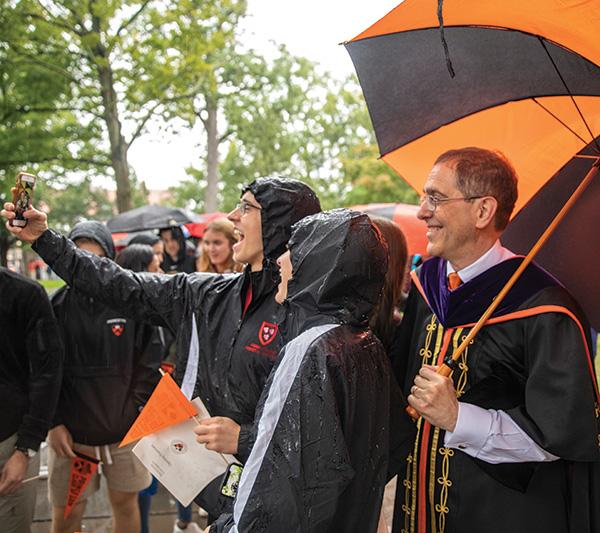
An important part of the undergraduate experience is learning what you’re not good at. Is there room for failure at Princeton? Can the University help teach students that getting a bad grade isn’t necessarily a crisis, but may be a learning experience?
I certainly hit a wall with my physics classes freshman year. I got a C in my second semester, and I count that basically as a victory. But it was something that I survived and frankly, it later made me a better teacher. The experience of being in a classroom and working hard and not being able to get it was an important experience for me to have. Because it meant when I had students in my own classroom who weren’t understanding something, part of what I was thinking was, OK, I’ve been there.
There’s a tendency in every generation to point at the next generation and ask, ‘Why aren’t they like us?’ I think that all of us, as we age, have to be very mindful of that. As I spend time out with students, what I’m impressed by is the ways in which they’re different from us. There are times when I might wish that, OK, maybe they could be a little more like us, but there are also times I think, they’re better than we were.
I do think one thing that has become a problem since I was a student is that, when I got that C — I can’t remember if it was the first C I had ever received or not — but nowadays there are so many students who, partly as a result of their parents’ pressure, and even intervention, are producing curated, perfect transcripts as they come through high school. They might not have learned that, all right, I didn’t get an A in this class, I could have done better, and that’s OK. It’s all going to be fine. I think that is something that we ought to try to build into our curriculum and our student experience.
We have to meet our students where they are, of course, but it’s important that we be able to provide students with feedback that says, ‘There were good things about this assignment, but you should want to be doing even better, and I need to give you feedback that allows you to see that.’ The language in which we do that and the way in which we do that may have to be different than when we were at Princeton, but I think our students recognize how important it is to be able to fail and then pick yourself up again. They know that experience is important.
Howard Husock *82 asks: There was a lot of controversy about the decision to fire Professor Joshua Katz last year. Looking back, would you have done anything differently?
It’s hard for me to comment in any specific way about a personnel matter. I’m sure there are things that could have been done differently on most of the hard things that I have had to manage during my tenure. What I will say is that, on the critical aspects of the actions the University took with respect to Professor Katz, including the decision that he had to be terminated because he obstructed an investigation into his sexual exploitation of an undergraduate under his supervision, I think we made the right decisions and I think I need to leave it at that.
Joseph Miller ’63 asks: What is Princeton doing to establish a balance of conservatives versus liberals among the faculty?
I appreciate the question. We believe in the importance of vigorous truth-seeking discussion on the campus, but I think that gets beyond labels such as liberal and conservative.
I’ll just give you an example. When I was on the constitutional law faculty here, I thought it was very healthy that Robby George and I disagreed about both the constitutionality of abortion and its morality. What added to the vigor of those arguments is that we had a broad range of views, some of which wouldn’t get labeled as conservative or liberal among constitutional scholars. One of the people who was participating in those disputes at the time, by the way, was Professor Keith Whittington. I really couldn’t have told you, and it never occurred to me to think it material to ask, whether Keith regarded himself as a conservative or a liberal. He had a set of views that were different from mine, and different from Robby George’s, and it made for much richer arguments. So, when Keith, Robby, and I are having these debates, it’s not point-counterpoint, where the idea is to have somebody representing the Republican Party platform and somebody representing the Democratic Party platform. It’s to get at some of the issues that we think are the deepest issues in constitutional law and interpretation.
So, what we try to do, and we always push ourselves to do better, is to find ways to have vigorous argument about the questions that matter on our campus. I regard that as something different than just creating a balance between liberal and conservative views. We’re a truth-seeking institution, not a kind of bipartisan debate club. Those are two different things. Now, I do worry at times that people’s biases can get in the way of making the best appointments, and that’s something we try to overcome. We try to make sure that we have strong arguments that need to be represented on the campus. I think that is partly a result of the James Madison Program in American Ideals and Institutions and what Robby has created there. The presence of strong conservative voices is good right now at Princeton, and probably even better than when we were students.
There is a move to unionize Princeton’s graduate students. How might unionization change the relationship that Princeton has historically had
with its grad students?
We’ve put out a set of Q and A’s about this, and if people are really interested in the details, they can consult those. [Editor’s note: See bit.ly/GS-faqs.]
I think that the essence of the University’s relationship with our graduate students is the relationship between the faculty member and the student, and it benefits from the fluidity of student-teacher relationships and the possibilities for mentorship that arise out of that. A unionized structure creates a lot more formality in that regard. What I think we’ve tried to convey is that students are making this choice, and they have a right to make it. But it is also important for our students and alumni — both undergraduate and graduate alumni — to understand that, one way or another, we’re going to continue to do everything we can to make sure that our graduate students flourish on this campus.
Regardless of what happens with regard to unionization, from my standpoint, I think that relationship has been working well, especially over the last several years. At the beginning of my presidency, we had a task force on the future of the graduate school in which graduate students participated. One of the priorities that emerged out of that was getting more housing for graduate students. That housing is being built right now in the Meadows neighborhood. We anticipate that when it opens, we’ll be able to meet 100% of graduate student demands for on-campus housing. Last year, we raised graduate stipends by 25%, and there’s another increase coming this year, which had been in the works long before any of the unionization activity surfaced. So, I think that we have a good and strong relationship with our graduate students. Our most profound hope on this is that we find a way to continue that relationship, whatever happens.
Interview conducted and condensed by Mark F. Bernstein ’83

